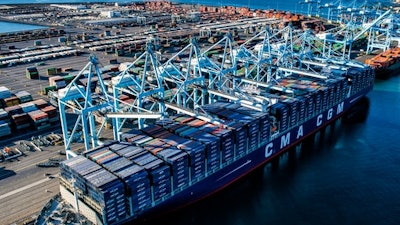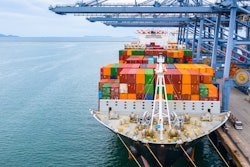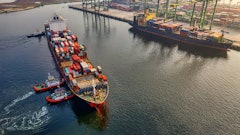
In October, the East and Southeast U.S. were struck by a series of compounding crises that severely impacted the region. Within a short span, Hurricane Helene devastated the Southeast, the International Longshoremen’s Association port strike shut down ports along the East and Gulf Coasts for three days, and Hurricane Milton made landfall in Florida as a Category 3 storm. Events like these are difficult to predict and even harder to plan for.
The week starting Sept. 30 marked the lowest number of inbound container vessels for both coasts, with the Gulf Coast falling 48% and the East Coast falling 47%, according to project44 data. Despite the East Coast also battling hurricanes, vessel traffic on both coasts recovered quickly after the strike, which lasted from Oct. 1-3.
Key takeaways:
- Despite the quick recovery in inbound container vessel numbers, there was still a significant number of vessels anchored outside major ports. This indicates a backlog and congestion within the ports causing delays, which peaked during the same week as the strike but has since improved. However, the ports of Savannah and Norfolk are still experiencing a higher-than-usual number of vessels at anchor.
- The Port of Houston however did not see a similar increase in anchored container vessels, likely due to the large volume of tanker vessels it handles because of its proximity to oil refineries.
- Dwell times were impacted. Import dwell times at ports less affected by the hurricanes peaked during the week of Sept. 30 due to containers sitting untouched for three days during the strike. In Jacksonville, Fla., there was a spike during the week of Sept. 9 due to Hurricane Francine, followed by another spike after Hurricane Helene made landfall on the Sept. 26. Before Florida had a chance to recover, Milton made landfall, leading to delays of 7-8 days for import containers. Dwell times returned to more typical levels the week of Sept. 14 after a 250% increase.
- Overall, export container dwell times were less affected by the hurricanes and strikes than import dwell times. Jacksonville saw a median dwell time of 13 days during the week of Oct. 7, compared to a typical range of 1-8 days. New York and Savannah also experienced spikes during the week of Sept. 30, but ports have since returned to normal export dwell levels.
- Overall full truckload on-time performance throughout the United States dropped by 2.5% between the weeks Helene and Milton made landfall.
- Florida faced significant impacts in the last-mile delivery industry as roads became difficult to navigate and workers evacuated for safety.
- Shipments inbound to Florida were most affected, likely due to infrastructure damage, labor shortages, and reduced capacity as high-priority aid shipments took precedence. At its worst-performing week, two out of every five shipments were delivered late, and performance was trending 24% lower than the overall market.
- Outbound shipments also underperformed, lagging around 10% behind the overall market. They were impacted by many of the same issues as inbound shipments, but power outages also contributed to delays in order fulfillment.
- While both inbound and outbound shipments for Florida have improved, they still lag behind the overall market trend.
“In summary, Hurricane Milton exacerbated existing supply chain vulnerabilities in the wake of Hurricane Helene and the ILA port strike, leading to widespread delays across ocean freight, truckload shipments, and last-mile deliveries. While inbound container vessel traffic recovered quickly after the strike, port congestion, especially in Savannah and Norfolk, continues to cause delays. Truckload shipments in the Southeast remain particularly impacted, with on-time performance significantly lower than in other regions. Florida's last-mile deliveries have also faced severe disruptions, but service levels are gradually improving. Overall, the compounding effects of these crises highlight the ongoing challenges in maintaining supply chain resilience in the face of disruptions, including natural disasters and labor disputes,” according to project44.




















